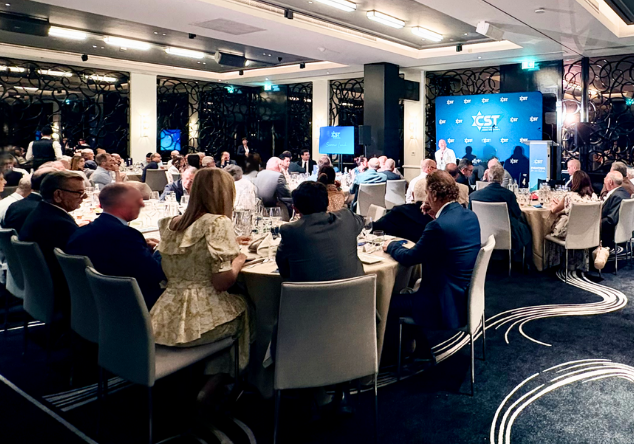CST Blog
Shallow polemic on pro-Israel lobby
18 November 2009
David Cesarani, research professor in history at Royal Holloway, University of London, and noted expert on Holocaust and antisemitism related issues, has written a very interesting article about Channel 4's Dispatches investigation of Britain's pro-Israel lobby. (The programme attracted 660,000 viewers, 2.6% of the audience share: an average total for Dispatches, suggesting it did not spark any great interest beyond the usual circles for such material).
Cesarani's article originally appeared on the Guardian's Comment is Free website. It is reproduced in full, below, but can also be read in its original Comment is Free setting, here. It is followed by a typical chain of comments from Comment is Free readers. These show a full range of very strong opinion for and against the programme, although the most extreme and obviously racist comments have been removed by the website moderators,
Cesarani's article is as follows:
Peter Oborne's investigation into Britain's pro-Israel lobby shows one side of a complicated picture. It will do more harm than good
In his Dispatches programme on the pro-Israel lobby, and the accompanying online pamphlet authored with James Jones, Peter Oborne sets out to expose a secretive lobby of rich and powerful Jews who use money and strong-arm tactics to skew British foreign policy in favour of Israel, intimidate MPs, and stifle media criticism of Zionism. Sadly, the result is more heat than light, a controversy that will confuse issues rather than explain anything.
It may have worse consequences. Oborne rightly rejects the argument that criticism of Israel is a form of antisemitism and reiterates the received wisdom that the accusation of antisemitism is used to muzzle Israel's critics. Yet within minutes of the programme finishing, the comments page of the C4 website carried crude anti-Jewish invective.
Oborne showed beyond doubt that there are well-resourced pro-Israel advocacy groups operating in the UK. Like other campaigning organisations they mobilise financial support for political allies and cultivate friends in parliament. Both the Conservative Friends of Israel and the Labour Friends of Israel wine and dine MPs at party conferences and fly them in batches to Israel for PR tours. But this is standard operating procedure for lobbying.
Indeed, Oborne repeatedly states that: "The pro-Israel lobby does nothing wrong, or illegal." So what is Oborne's beef about the pro-Israel activists? First, he complains that they operate semi-covertly. Although he disavows any imputation of a conspiracy, that is what his charge amounts to. The pro-Israel lobby "needs to be far more open about how it is funded and what it does". But the same can be said about Michael Ashcroft, Rupert Murdoch, the arms industry, the Saudi Arabians, and the list can go on.
More to the point, the evidence he amasses comes mostly from publicly disclosed sources, such as the register of MPs' interests. Political donations have to be made public, too, and these lists provide much of his ammunition. Like many who claim to expose the secretive behaviour of lobbyists, it turns out that much of what they do is already open to scrutiny. With manipulative skill Oborne builds up the frisson of exposing a conspiracy while using publicly available information as evidence and, the ultimate chutzpah, at the same time as declaring that the lobby is doing nothing wrong.
A second strand to his thesis is that pro-Israel campaigners target the media and crush any criticism of Israel. But anyone who remembers the coverage of Israel's assault on Gaza or the battering of Lebanon in 2006 may wonder what more the media could have done to show the appalling effects of Israeli military tactics.
Oborne charges that British policy in the Middle East is being influenced by foreigners with interests inimical to those of Britain and the peace process in general. Specifically, he focuses on Poju Zabludowicz, a Finnish-Jewish ex arms dealer and tycoon who bankrolls the Britain Israel Communications and Research Centre (Bicom).
Oborne asks two experts, Professor David Newman and Rabbi David Goldberg, if they have ever heard of Zabludowicz and when they draw a blank he paints the billionaire Finn as some kind of Trilby figure a man of mystery and power.
Perhaps he asked the wrong people. Zabludowicz is regularly in the Sunday Times Rich List, is often mentioned in the Jewish Chronicle, and was even listed as the second most powerful man in the British Jewish community in the JC's annual round up of the great and the good. Newman and Goldberg need to get better informed. More pertinently for an investigative journalist, so does Oborne.
However, the real problem with Zabludowicz lies with his investments in Israel. As well as financing an Israel advocacy outfit and donating generously to the Tories, he owns a share in a shopping mall in Ma'ale Adumim, a town built on occupied territory in the West Bank. This, Oborne intones, means that a man with a stake in obstructing the peace process has an undue influence on British politics.
But how do Poju's real-estate deals compare with UK investments in the Middle East oil industry or arms sales to the Gulf states? What impact do they have on the determination of UK foreign policy? As so often in programmes of this type, there is no context and no perspective.
Finally, Oborne and Jones dispute whether British and Israeli foreign policy interests should go in step. They suggest that the amity is false and based on the money power of the hidden lobby or the result of kowtowing to America, which is pretty much the same thing in their world. Oborne never pauses to explore whether Israeli friendship might be a strategic asset at a time when the UK and Israel face the same threats in the Middle East. Throughout this masquerade Oborne presents just one side of a complicated picture. This is nowhere more so than in the depiction of the pro-Israel lobby as a controlling force in British Jewish life. In fact, the Jews in this country are bitterly divided over Israel. Nor do they agree about Britain's foreign policy. Every point of view is vented, none is suppressed.
Why then are British Jews, who tend to be dovish regarding Israel, so alarmed about attacks on Israel and supposed revelations about Jewish lobbies? Just look at the comments that followed transmission of Oborne's documentary and you can see why.
At 21.34 Stuart Downie posted his congratulations to the brave programme makers who showed that "the UK parliament has, like the USA senate and congress, become Israel's occupied territory". It showed that British MPs "buckle under pressure from people whose first loyalty is not to the UK but to the State of Israel". So in a few lines this posting accused Jews of dual-loyalty and echoed the name ZOG Zionist Occupied Government that the far right in the US uses to designate Washington.
A few comments further on and Detta asked, "why does Israel have such power? Why do most of the world seem afraid of upsetting them?" Nazir, posting at 12.11, chimed in that it is "time to reclaim British policy from those working for a foreign country".
We have thus left the reality in which Israel is internationally isolated and regularly pounded by the UN, and in which sincere men and women support Israel because they think it is an embattled democracy that shares many of the values held dear in Britain, as well as facing many of the same foes. Guided by Oborne and Jones we are drifting into the world of fantasy and phobia.
Despite their proclaimed efforts to avoid such an outcome their shallow and irresponsible polemic will do more damage than good. It will only reinforce the very fears that cause British Jews to rally behind Israel, right or wrong.
Read More

Antisemitic Incidents Report January-June 2025
6 August 2025

CST Summer Lunch 2025
25 June 2025
CST Annual Dinner 2025
26 March 2025
